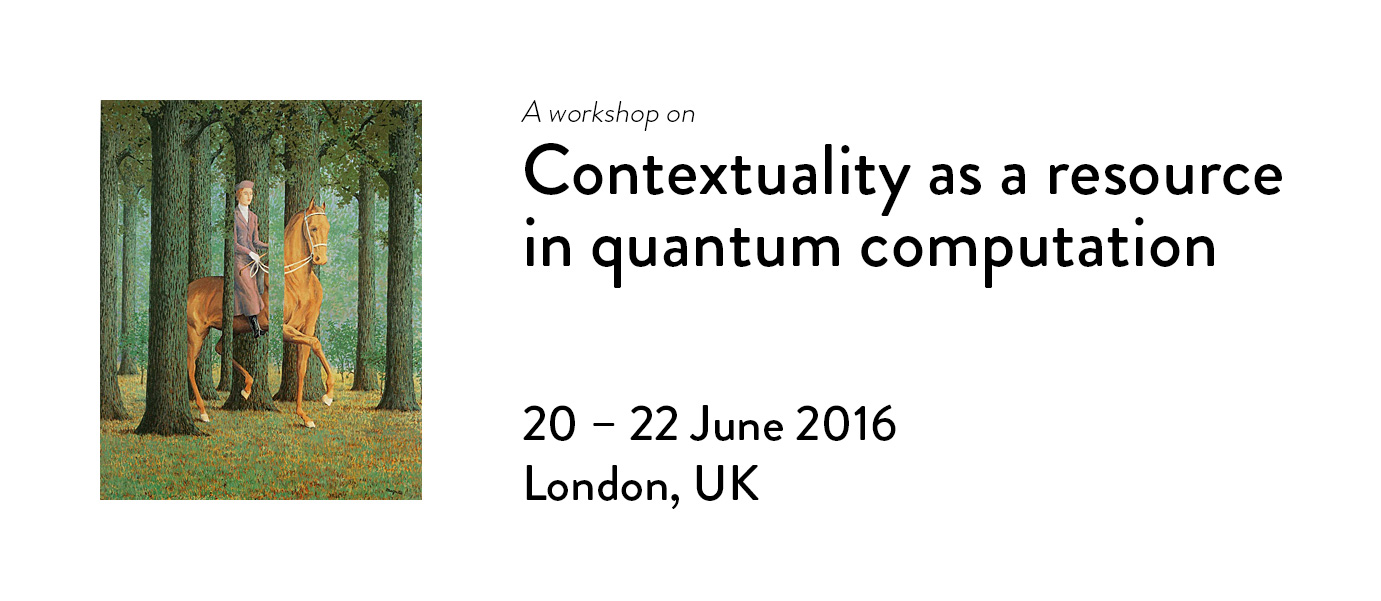
AIM
I. Synthesizing and developing the various frameworks for nonlocality/contextuality towards a structural understanding of the role contextuality plays in achieving quantum advantage in information processing.
II. Applying these tools in both concrete models of quantum computation (e.g. MSD and MBQC) and more abstract models of computation.
This workshop will bring together experts in theoretical computer science, quantum information and computation, and quantum foundations who are interested in these (and related) questions.
VENUE
66 Gower Street, London WC1E 6EA
PARTICIPANTS
Ana Belén Sainz (Bristol)
Andreas Winter (Barcelona)
Antonio Acín (ICFO)
Dan Browne (UCL)
Eric Cavalcanti (Griffith)
Hakop Pashayan (Sydney)
Joel Wallman (IQC)
Joseph Emerson* (Waterloo, IQC)
Mark Howard (Sheffield)
Matt Pusey (Perimeter)
Nadish de Silva (UCL)
Robert Raussendorf (UBC)
Rui Soares Barbosa (Oxford)
Samson Abramsky (Oxford)
Shane Mansfield (Paris VII)
Simone Severini (UCL)
Stephen Bartlett (Sydney)
*To be confirmed.
Organiser.
TALKS
| MONDAY | TUESDAY | WEDNESDAY | |||||
|---|---|---|---|---|---|---|---|
| 10:00 | Arrival (30) | 10:00 | Antonio Acín (60) | 10:00 | Dan Browne (60) | ||
| 10:30 | Mark Howard (60) | 11:00 | Stephen Bartlett (60) | 11:00 | Rui Soares Barbosa (60) | ||
| 11:30 | Hakop Pashayan (60) | 12:00 | Lunch (120) | 12:00 | Lunch (120) | ||
| 12:30 | Lunch (120) | 2:00 | Shane Mansfield (45) | 2:00 | Joseph Emerson (60) | ||
| 2:30 | Joel Wallman (60) | 2:45 | Nadish de Silva (45) | 3:00 | Matthew Pusey (60) | ||
| 3:30 | Ana Belén Sainz (60) | 3:30 | Break (30) | 4:00 | Discussion | ||
| 4:30 | Break (30) | 4:00 | Robert Raussendorf (60) | ||||
| 5:00 | Andreas Winter (60) | 5:00 | Discussion (60) | ||||
| 6:00 | Discussion (60) | ||||||
| 7:00 | Pub | 7:30 | Workshop dinner | ||||
Any combination of slides/whiteboard can be accommodated.
TITLES & ABSTRACTS
Mark Howard
Magic state quantum computing and contextuality
I will discuss the stabilizer formalism, the discrete Wigner function and the necessity of contextuality for universality in the magic state model of fault-tolerant quantum computing with qudits. I will also briefly mention some resource-theoretic interpretations of magic.
Hakop Pashayan
Introduction to negativity & simulation
Some basic introductory material on negativity as a resource and simulation. If time permits, a connection between negativity and contextuality.
Ana Belén Sainz
Contextuality and nonlocality: a unifying framework
Most work on contextuality so far has focused on specific examples and concrete proofs of the Kochen-Specker theorem, while general definitions and theorems about contextuality are sparse. For example, it is commonly believed that nonlocality is a special case of contextuality, but what exactly does this mean? In this work, that builds on the graph-theoretic approach of Cabello, Severini and Winter, we develop a hypergraph approach to study contextuality and nonlocality in a unified manner. In this talk I will further focus on the relation between some sets of probabilistic models and graph invariants, and show that the set of quantum models cannot be characterized by any such graph-theoretic quantity.
Andreas Winter
Experimental tests of contextuality inequalities & measures of contextuality
Joint work with Damian Markham (Paris).
Antonio Acín
Deterministic explanations of non-local correlations have to be uncomputable
Quantum mechanics postulates random outcomes. However, a model making the same output predictions but in a deterministic manner would be, in principle, experimentally indistinguishable from quantum theory. In this work we consider such models in the context of non-locality on a device independent scenario. That is, we study pairs of non-local boxes that produce their outputs deterministically. It is known that, for these boxes to be non-local, at least one of the boxes' output has to depend on the other party's input via some kind of hidden signaling. We prove that, if the deterministic mechanism is also algorithmic, there is a protocol which, with the sole knowledge of any upper bound on the time complexity of such algorithm, extracts that hidden signaling and uses it for the communication of information.
Nadish de Silva
Graph-theoretic strengths of contextuality
Cabello-Severini-Winter and Abramsky-Brandenburger/Abramsky-Hardy both describe complete classes of noncontextual inequalities using vastly differing techniques. We detail the link between them and give simple, graph-theoretic methods for finding inequality-free proofs of nonlocality/contextuality and for finding states exhibiting strong nonlocality/contextuality (as defined by AB). Finally, we apply these methods to concrete examples in stabilizer quantum mechanics relevant to understanding contextuality as a resource in quantum computation.
Robert Raussendorf
Cohomological framework for contextual quantum computations
We present a cohomological formulation of measurement-based quantum computation (MBQC), employing the notion of a phase function. The phase function describes symmetries of the resource state of the MBQC, specifies the computational output, and acts as a contextuality witness. It is also a topological object, namely a 1-cochain in group cohomology. Contextuality in the computation is revealed by non-exactness of the phase function. Furthermore, for any given MBQC the speedup is bounded by the maximum violation of a corresponding non-contextuality inequality.
Dan Browne
Contextuality as a resource for qubit quantum computation
We describe a scheme of quantum computation with magic states on qubits for which contextuality is a necessary resource possessed by the magic states. More generally, we establish contextuality as a necessary resource for all schemes of quantum computation with magic states on qubits that satisfy three simple postulates. Furthermore, we identify stringent consistency conditions on such computational schemes, revealing the general structure by which negativity of Wigner functions, hardness of classical simulation of the computation, and contextuality are connected.
Matthew Pusey
Contextuality as a resource theory
LOCAL INFO
A map with recommended choices for lunch can be found here. Tottenham Court Road and Charlotte Street are both resplendent with culinary choice. WiFi can be accessed through Eduroam or through UCLGuest via the event code "Contextuality".
SPONSORS
This workshop is funded by the EPSRC and is a joint project between University College London and the University of Oxford.
CONTACT
swap("@ucl.ac.uk","nadish.desilva")